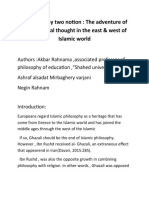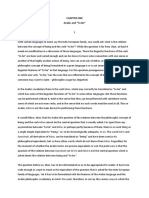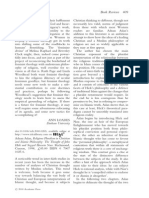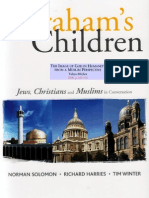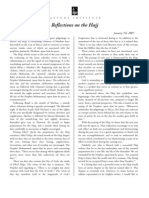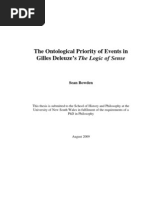Phenomenology Ibn Arabi 978-1-4020-6160-8 - 15
Phenomenology Ibn Arabi 978-1-4020-6160-8 - 15
Uploaded by
Nil AynalıCopyright:
Available Formats
Phenomenology Ibn Arabi 978-1-4020-6160-8 - 15
Phenomenology Ibn Arabi 978-1-4020-6160-8 - 15
Uploaded by
Nil AynalıOriginal Title
Copyright
Available Formats
Share this document
Did you find this document useful?
Is this content inappropriate?
Copyright:
Available Formats
Phenomenology Ibn Arabi 978-1-4020-6160-8 - 15
Phenomenology Ibn Arabi 978-1-4020-6160-8 - 15
Uploaded by
Nil AynalıCopyright:
Available Formats
ROBERT J.
DOBIE
THE PHENOMENOLOGY OF WUJUD IN THE
T H O U G H T O F I B N A L - ‘A R A B I
The concept of wujud or “existence” stands at the center of Ibn ‘Arabi’s
thought with his most immediate successors attempting to capture the essence
of his thought with the formula, wahdat al-wujud, or “the unity of existence.”1
But like most translations from Arabic, the word “existence” only gives us
a flat and abstract idea of what Ibn ‘Arabi means by wujud. Wujud means
“existence” or “being” only derivatively and in its passive sense: originally
and actively it means, “to find,” “to hit upon,” “meet with,” “get” or “obtain,”
“to invent” or “to find (good or bad).” In other variations of pattern upon
the basic root, which makes the meaning of every Arabic word so rich and
polyvalent, wajada can mean, “to produce, originate, create or bring about,”
or it can mean, “to be passionately in love with” or “to grieve for,” or, yet
again, “to turn up,” “appear,” “be there.” I submit that if we look at all of these
different but related meanings of the root wajada we have before us in the
thought of Ibn ‘Arabi and in the Arabic language itself a phenomenological
understanding the “matter” or Sache of Being and time. “To be” is “to be
found” or “to turn up,” “to be there” or, in other words, “to appear” or “to
presence” out of the flow of temporality. As such truth is the self-disclosure
of Being out of the flow of created temporality that evokes or should evoke
a human response of appropriation or, as Heidegger puts it, of er-eignis – of
“en-owning.” For, by doing so, the human subject finds his or her true ground
in the divine Essence, in which lies his or her “secret of destiny” (qadr).
To explore the phenomenological nature of Ibn ‘Arabi’s thought, I shall look
at the thought of the later Heidegger and, in particular, the relatively late
lecture, On Time and Being. This is because I find Heidegger’s thinking, of
those in the phenomenological tradition, closest in content and spirit to Ibn
‘Arabi’s. In his lecture, Heidegger attempts to think yet again the relationship
between Being and time some thirty-five years after Being and Time. For
313
A-T. Tymieniecka (ed.),
Timing and Temporality in Islamic Philosophy and Phenomenology of Life, 313–322.
© 2007 Springer.
314 ROBERT J. DOBIE
him, the great puzzle that he did not adequately address in his great work
is the idiom, when we talk about what is there in the world, that “there is”
Being or time or, as the idiom is in German, “it gives (es gibt)” Being or
time. Being or time “is,” and yet Being or time is no-thing; it is not an entity
like other entities. As Heidegger puts it:
Being is not a thing, thus nothing temporal, and yet it is determined by time as presence. Time is
not a thing, thus nothing which is, and yet it remains constant in its passing away without being
something temporal like the beings in time. Being and time determine each other reciprocally,
but in such a manner that neither can the former – Being – be addressed as something temporal
nor can the latter – time – be addressed as a being.2
Time determines Being as a “presencing” or “making present” to the “being-
there” or da-sein of human existing; Being determines time insofar as without
the coming-to-presence of being, there would be no time. Thus, for Heidegger,
what we need to think is not “Being” or “time” insofar as they are things or
entities, but we need to think their presencing: the “there is” or “It gives” of
time and Being.
Heidegger argues that the German form of the idiom, “there is,” – “It
gives” or es gibt – is the most pregnant with possibilities for understanding
the relationship of time and Being. We must think not the being that is
given nor even the “being” or “entity” that is presumed to give being but
the giving of Being itself: “To think Being explicitly requires us to relin-
quish Being as the ground of beings in favor of the giving which prevails
concealed in unconcealment, that is, in favor of the It gives.”3 But it is
Heidegger’s contention that the Western philosophical tradition has forgotten
and ignored the “it gives” in favor of that which is given: “At the beginning
of Being’s unconcealment, Being, einai, eon is thought, but not the ‘It
gives’, ‘there is’. Instead, Parmenides says ein gar einai, ‘For Being is’.”4
According to Heidegger, then, the temporality of Being has been forgotten;
the primal giving or presencing of being has been obscured in favor of
what is given in the “present” as such. It follows that the primal nature of
truth as aletheia or “unconcealment” or “bringing-to- presence” has been
forgotten.
Heidegger argues that this is the historical destiny of a particular “epochal
sending” of Being that has its origins in the Greeks. If to think the “It gives” of
Being is the more primordial thinking of Being, then the primordial meaning
of Being is always conditioned by temporality: a sending and simultaneous
withdrawal of the “It gives”: “The history of Being means the destiny of
Being in whose sendings both the sending and the It which sends forth
hold back with their self- manifestation. To hold back is, in Greek, epoche.
Hence we speak of the epochs of the destiny of Being.”5 Since this original
You might also like
- Gr11 Mathematics P2 (ENG) NOV Possible AnswersDocument17 pagesGr11 Mathematics P2 (ENG) NOV Possible AnswersLithemba MbungeNo ratings yet
- LEGHARI-SAEED.a. Creativity and The MicrocosmDocument7 pagesLEGHARI-SAEED.a. Creativity and The MicrocosmabdulkarimdíazNo ratings yet
- Hollenberg Neoplatonism in Pre-Kirmanian Fatimid DoDocument44 pagesHollenberg Neoplatonism in Pre-Kirmanian Fatimid Doappart10504799100% (2)
- Literalism, Empiricism, and Induction: Apprehending and Concretizing Islamic Law's Maqâsid Al-Sharî'ah in The Modern WorldDocument18 pagesLiteralism, Empiricism, and Induction: Apprehending and Concretizing Islamic Law's Maqâsid Al-Sharî'ah in The Modern Worldsalleyye100% (2)
- Test For Systems AdministratorDocument6 pagesTest For Systems Administratorria_11No ratings yet
- Ghazālī & The Avicennan Proof From Personal Identity For An Immaterial Self-Michael MarmuraDocument11 pagesGhazālī & The Avicennan Proof From Personal Identity For An Immaterial Self-Michael Marmuraproklos0% (1)
- Jeffrey Einboden DanteDocument15 pagesJeffrey Einboden DantepomahskyNo ratings yet
- Existence As A Predicate in Kant and Mulla Sadra Reza AkbarianDocument13 pagesExistence As A Predicate in Kant and Mulla Sadra Reza AkbarianElhkmah CentreNo ratings yet
- Islamic ThoughtDocument7 pagesIslamic ThoughtabbasameeriNo ratings yet
- The Configuration of The Temple of The Ka'Bah As The Secret of The Spiritual Life According To The Work of Qadi Sa'Id QummiDocument117 pagesThe Configuration of The Temple of The Ka'Bah As The Secret of The Spiritual Life According To The Work of Qadi Sa'Id QummiIbrahima SakhoNo ratings yet
- Ibn ArabiDocument3 pagesIbn ArabiAhmed SharafNo ratings yet
- In Memoriam, Michael E. Marmura (1929-2009) PDFDocument8 pagesIn Memoriam, Michael E. Marmura (1929-2009) PDFRaas4555No ratings yet
- Fadlou Shehadi - Arabic and 'To Be'Document14 pagesFadlou Shehadi - Arabic and 'To Be'Bob ElbrachtNo ratings yet
- Transcendent Philosophy - Vol. 11: Dec 2010Document223 pagesTranscendent Philosophy - Vol. 11: Dec 201020120422No ratings yet
- Intimate Conversations by Abdullah AnsariDocument91 pagesIntimate Conversations by Abdullah AnsariSafak BaskayaNo ratings yet
- The Hermeneutics of Imitation and Adab in Ibn Arabī PDFDocument20 pagesThe Hermeneutics of Imitation and Adab in Ibn Arabī PDFMehdiSaidNo ratings yet
- Right Hand of Truth. Life and Work of Titus Burckhardt (William Stoddart) PDFDocument5 pagesRight Hand of Truth. Life and Work of Titus Burckhardt (William Stoddart) PDFIsraelNo ratings yet
- Landolt - Aziz-I Nasafi and The Essence-Existence DebateDocument7 pagesLandolt - Aziz-I Nasafi and The Essence-Existence DebateBirgi ZorgonyNo ratings yet
- The Bulaq Diwan of Ibn ArabiDocument28 pagesThe Bulaq Diwan of Ibn ArabischolarlypurposeNo ratings yet
- Gulistan Sa'diDocument330 pagesGulistan Sa'dipomegranate2460% (1)
- Wisdom Hikmah As Perceived by Iranian MuDocument12 pagesWisdom Hikmah As Perceived by Iranian MulistboxNo ratings yet
- The Sufi Interpretation of The Letter Alif - The Sufi TavernDocument15 pagesThe Sufi Interpretation of The Letter Alif - The Sufi TavernhooluizNo ratings yet
- John Hick and Seyyed Hossein NasrDocument3 pagesJohn Hick and Seyyed Hossein NasrashfaqamarNo ratings yet
- The Fiqh of Itikaf HanafiDocument3 pagesThe Fiqh of Itikaf Hanafidervish2No ratings yet
- Necessitated Evil An Islamic NeoplatonicDocument22 pagesNecessitated Evil An Islamic NeoplatonicTalmeez Hussain100% (1)
- The Poems of Mulhid VadetiDocument7 pagesThe Poems of Mulhid VadetiScottie GreenNo ratings yet
- Yahya Michot, The Image of God in Humanity From A Muslim PerspectiveDocument18 pagesYahya Michot, The Image of God in Humanity From A Muslim PerspectiveYahya Michot80% (5)
- Alexandrin - Prophetic Ascent NumanDocument16 pagesAlexandrin - Prophetic Ascent NumanStudent_of_Religion100% (1)
- Prayer of Blessing On The Prophet MuhammDocument58 pagesPrayer of Blessing On The Prophet MuhammZahidNo ratings yet
- French Philosopher Henry CorbinDocument4 pagesFrench Philosopher Henry CorbinИван ПетровићNo ratings yet
- Mulla Sadra On The Efficacy of PrayerDocument26 pagesMulla Sadra On The Efficacy of PrayermiguelNo ratings yet
- Bedil in The Light of Bergson PDFDocument29 pagesBedil in The Light of Bergson PDFQuratUlAinNo ratings yet
- Christian Jambet - Four Discourses On The Authority of IslamDocument19 pagesChristian Jambet - Four Discourses On The Authority of IslamKenneth AndersonNo ratings yet
- Reza Shah Kazemi - Rahma and KarunáDocument13 pagesReza Shah Kazemi - Rahma and KarunáGabrielNo ratings yet
- The Concept of Divine Love According ToDocument6 pagesThe Concept of Divine Love According ToAbdur RahmanNo ratings yet
- Avicennas Philosophical Tafsir of Surat Al IkhlasDocument16 pagesAvicennas Philosophical Tafsir of Surat Al IkhlashboesmanNo ratings yet
- Stanford Encyclopedia of Philosophy: SuhrawardiDocument18 pagesStanford Encyclopedia of Philosophy: SuhrawardilistboxNo ratings yet
- IMAGINATION and Its Role in Major Escato PDFDocument15 pagesIMAGINATION and Its Role in Major Escato PDFS⸫Ḥ⸫RNo ratings yet
- Gods Knowledge of Particulars Avicenna MDocument32 pagesGods Knowledge of Particulars Avicenna MFaisal MajeedNo ratings yet
- Al Qushayri and His Legacy JssDocument6 pagesAl Qushayri and His Legacy JssashfaqamarNo ratings yet
- Courage of HallajDocument23 pagesCourage of HallajJohn-abouna D'AltonNo ratings yet
- Mulla Sadra's Idea of Existence N Motion in Substance N Its Educational Implications - JavidiDocument15 pagesMulla Sadra's Idea of Existence N Motion in Substance N Its Educational Implications - JavidiSyayhan JindanNo ratings yet
- El-Fekkak, Badr - Justice As Divine Providence in Al-FarabiDocument20 pagesEl-Fekkak, Badr - Justice As Divine Providence in Al-FarabiJonathan DubéNo ratings yet
- A Dialogue With Aamir MughalDocument5 pagesA Dialogue With Aamir MughalAamir Mughal0% (1)
- Advice To The Serious Seeker: Meditations On The Teaching of Frithjof SchuonDocument11 pagesAdvice To The Serious Seeker: Meditations On The Teaching of Frithjof SchuonAlejandroNo ratings yet
- Schuon, Frithjof - Letters, Statements & TextsDocument53 pagesSchuon, Frithjof - Letters, Statements & TextsKernel PanicNo ratings yet
- Sufism or Tasawwuf Is Defined by Its Adherents As The InnerDocument2 pagesSufism or Tasawwuf Is Defined by Its Adherents As The InnerAaim KhanNo ratings yet
- Inscription On Attar's TombDocument11 pagesInscription On Attar's TombMohammed Abdul Hafeez, B.Com., Hyderabad, India100% (1)
- Reflections On The HajjDocument4 pagesReflections On The HajjPanji DarmanNo ratings yet
- Ibn Abbad Sermon On MawlidDocument20 pagesIbn Abbad Sermon On MawlidscholarlypurposeNo ratings yet
- Nilchian - PHD Thesis - 2011 PDFDocument271 pagesNilchian - PHD Thesis - 2011 PDFSara xxNo ratings yet
- Abū Yazīd of Bistām A Turning-Point in Islamic MysticismDocument16 pagesAbū Yazīd of Bistām A Turning-Point in Islamic Mysticismcha072No ratings yet
- Endress - The Language of Demonstration. Translating Science and The Formation of Terminology in Arabic Philosophy and ScienceDocument23 pagesEndress - The Language of Demonstration. Translating Science and The Formation of Terminology in Arabic Philosophy and Sciencemario rossi100% (1)
- Saladdin Ahmed - What Is SufismDocument20 pagesSaladdin Ahmed - What Is SufismStela BratoevaNo ratings yet
- Balcerowicz Naya VadaDocument25 pagesBalcerowicz Naya VadaAz ZaNo ratings yet
- SSR Article p167 - 7Document8 pagesSSR Article p167 - 7sana P100% (1)
- Ahmed El-Wakil - The Prophet's Treaty With The Christians of NajranDocument82 pagesAhmed El-Wakil - The Prophet's Treaty With The Christians of NajranMario ŠainNo ratings yet
- The Legacy of Titus BurckhardtDocument3 pagesThe Legacy of Titus Burckhardtvehapkola100% (1)
- The Concept of Action in The Bhagvad-GitaDocument12 pagesThe Concept of Action in The Bhagvad-GitaAndres MontanoNo ratings yet
- Chittic, Love in Islamic Thought Chittick-LibreDocument16 pagesChittic, Love in Islamic Thought Chittick-LibreankasoteckaNo ratings yet
- 2 PDFDocument25 pages2 PDFJawad QureshiNo ratings yet
- Avicenna's Theory of Science: Logic, Metaphysics, EpistemologyFrom EverandAvicenna's Theory of Science: Logic, Metaphysics, EpistemologyNo ratings yet
- Jet Merit List (Af) 13 04 2023Document17 pagesJet Merit List (Af) 13 04 2023Subbu RajaNo ratings yet
- 01 Installing Windows Server 2012Document10 pages01 Installing Windows Server 2012TABLE OF WISDOMNo ratings yet
- I - The Art of The Occult - A Visual Sourcebook For The Modern MystDocument7 pagesI - The Art of The Occult - A Visual Sourcebook For The Modern Mystnr prmsNo ratings yet
- Three Things That Matter Most in Top School SystemsDocument42 pagesThree Things That Matter Most in Top School SystemsMellow YellowNo ratings yet
- Verb Ing or To British English Student Ver2 BWDocument4 pagesVerb Ing or To British English Student Ver2 BWMatthis TeplitxkyNo ratings yet
- 2016 - Browder and Göhde Fixed Point Theoremfor Monotone Nonexpansive MappingsDocument9 pages2016 - Browder and Göhde Fixed Point Theoremfor Monotone Nonexpansive Mappingshongquan19dhvNo ratings yet
- Excel Places To QuerryDocument34 pagesExcel Places To QuerryAkoSi AykeeNo ratings yet
- Python - How To Calculate Distance Between Highest Value of Function - Stack OverflowDocument6 pagesPython - How To Calculate Distance Between Highest Value of Function - Stack Overflow-' NandoNo ratings yet
- 10th 4 spDocument6 pages10th 4 spsumernegi83No ratings yet
- EMG 1102 Engineering Drawing CHAPTER ONE (2023)Document14 pagesEMG 1102 Engineering Drawing CHAPTER ONE (2023)osebe.bisonga23No ratings yet
- Assignment No. 1 Transcription and Speed Building 1. How Do You Transcribe Laughter? Answer: HR A - F 2. How Do You Past A Transcription Test? AnswerDocument2 pagesAssignment No. 1 Transcription and Speed Building 1. How Do You Transcribe Laughter? Answer: HR A - F 2. How Do You Past A Transcription Test? AnswerJona BustamanteNo ratings yet
- Concordance Table FinalDocument1 pageConcordance Table FinalMuhammad Reza PradectaNo ratings yet
- Windows 10 default apps wouldn't start. - Microsoft CommunityDocument3 pagesWindows 10 default apps wouldn't start. - Microsoft CommunitycftempestNo ratings yet
- A Living Shamanistic Oral Tradition: Ifugao Hudhud, The PhilippinesDocument3 pagesA Living Shamanistic Oral Tradition: Ifugao Hudhud, The PhilippinesRegz GasparNo ratings yet
- GP4 WindowsDocument183 pagesGP4 WindowsAndre WolfarthNo ratings yet
- Final Test Smp1smt 1 2008Document4 pagesFinal Test Smp1smt 1 2008Miskat AnwarNo ratings yet
- Ax2012 Enus Deviii 01Document18 pagesAx2012 Enus Deviii 01JoeNo ratings yet
- English Language Teaching Thesis TopicsDocument5 pagesEnglish Language Teaching Thesis TopicsBuyCustomPaperCanada100% (2)
- Web Technologies Fundamentals and HTTPDocument35 pagesWeb Technologies Fundamentals and HTTPsumanNo ratings yet
- Deleuze in Dogodek-PhdDocument7 pagesDeleuze in Dogodek-Phdkathy2412No ratings yet
- Reported Speech Practice Exercises by English With SimoDocument1 pageReported Speech Practice Exercises by English With SimoallalouaniaNo ratings yet
- Osy Microproject ProposalDocument2 pagesOsy Microproject ProposalAshishNo ratings yet
- Voicing in LuoDocument53 pagesVoicing in LuoNINA SASARI BERTRAMNo ratings yet
- Topic 20 InternetDocument9 pagesTopic 20 InternetMaría del Carmen Pacheco AlcedoNo ratings yet
- 2006Document10 pages2006박동현No ratings yet
- Google Ads Check-ListDocument10 pagesGoogle Ads Check-Listdcold6No ratings yet
- Copper and Brass Grades and AllumDocument9 pagesCopper and Brass Grades and Allumcarbo60No ratings yet
- Ug Project Report FormatDocument8 pagesUg Project Report FormatBala KrishnaNo ratings yet








